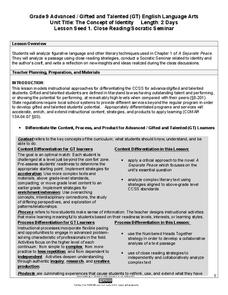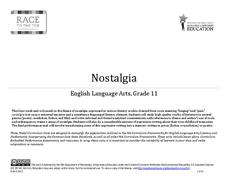United K12
Jan Brett Author Study
Expose young children to the wonderful works of author and illustrator Jan Brett using a few of her stories such as Armadillo Rodeo, The Mitten, or Daisy Comes Home through a unit study.
Museum of Tolerance
The Price of Personal Responsibility
A reading of Patrick Henry's "Speech in the Virginia Convention," Henry David Thoreau's "Civil Disobedience," and Rev. Martin Luther King, Jr.'s "Letter from Birmingham Jail" launch a discussion about the price one is willing to pay to...
Stanford University
Letter from Birmingham Jail: The Power of Nonviolent Direct Action
What strategies are most effective in changing an unjust law? Class members examine the tactics used in the Birmingham Campaign of 1963 (Project C) to achieve social justice and social transformation. After examining documents that...
Alabama Department of Archives and History
How Would You Feel? The Bravery of Civil Disobedience
As part of their study of the US Civil Rights Movement and the Montgomery bus boycott, class members read Dr. Martin Luther King's "Integrated Bus Suggestions." They then craft a short story about the first week of Montgomery bus...
Academy of American Poets
Teaching the Vietnam War with Poetry and Archives
The language of and the perspective of photographs, poems, and official reports differ. After a close reading of two photographs, two poems, and a military report about the Vietnam War, individuals adopt someone's voice or something from...
National Endowment for the Humanities
Dostoevsky's Crime and Punishment
Pain and suffering do not have to be inevitable in a study of Crime and Punishment. A carefully scaffolded lesson introduces readers to the divided natures of the characters in Fyodor Dostoevsky's complex novel. Groups use the provided...
Shmoop
ELA.CCSS.ELA-Literacy.RI.11-12.5: Structure of an Argument
Imagine a cross-curricular project that not only rewards learners for examining the textbooks used in their other classes but builds literacy skills as well! Groups compare the formats and writing style in their various textbooks. Teams...
Pearson
Langston Hughes
An author study provides learners the opportunity to explore in depth the life of, the influences on, and the works of a single literary figure. Introduce middle schoolers to Langston Hughes with a unit that models how to approach an...
Reed Novel Studies
Where The Red Fern Grows: Novel Study
Does hard work and determination really pay off? It seems that way for Billy, a character in Where The Red Fern Grows. After working for two years, he finally has enough money to buy the pups he's always wanted. Scholars read about the...
Curated OER
Letters to Poets
Add a strong poetry lesson to your literature unit. Middle and high schoolers investigate their writing voices with journaling and group discussion, then choose a famous poet to study. They write letters to their chosen poets, explaining...
ReadWriteThink
Persuasive Essay: Environmental Issues
Young environmentalists learn how to craft a persuasive essay about an environmental issue they consider important. After studying the components of a persuasive essay and examining a student model, writers brainstorm possible topics and...
National Endowment for the Humanities
Literary Genres in “Moby-Dick”
Moby Dick is more than a whale of a tale narrated by Ishmael. A lesson studying Herman Melville's classic novel asks readers to examine the different genres the author weaves into his story. Instructors model how to conduct a stylistic...
Maryland Department of Education
The Concept of Identity Lesson 1: Close Reading/Socratic Seminar
John Knowles' A Separate Peace provides readers with an opportunity to develop their close reading and analytical skills as they look for what Knowles feels are the factors that shape our identity.
Academy of American Poets
Teach This Poem: "Election Day, November, 1884" by Walt Whitman
To begin a study of Walt Whitman's poem, "Election Day, November 1884," learners first call out a word or two that describes their reaction to the recent presidential election. They then read an encyclopedia entry about the Presidential...
Alabama Department of Archives and History
African American Life After the Civil War - Sharecropping
What is the sharecropping system? What role did it play in the post-Civil War economy of the South? Who were the sharecroppers? Who employed them? How were they paid? To answer these questions, kids examine a series of sharecropper...
Curated OER
Narrative of the Life of Frederick Douglass by Frederick Douglass
Imagine what it was like to be a slave in the United States in 1845. Eighth graders are given an opportunity to experience life from the point of view of Frederick Douglass as they read and discuss an annotated passage from Narrative of...
Santa Ana Unified School District
Early American Poets
The poems of Walt Whitman and Emily Dickinson are the focus of a unit that asks readers to consider how an artist's life and changes in society influences his or her work. After careful study of Whitman's and Dickinson's perspectives on...
National Endowment for the Humanities
The Strategy of Containment, 1947–1948
How do people stop the spread of an ideology they don't think is right? Scholars research the policy of containment during the start of the Cold War. Small groups analyze primary sources to determine how the United States combated...
Texas Center for Learning Disabilities
Chapter 6 Teacher Guide and Student Log
Is work that is safe for adults also safe for children? That is the question class members consider as they continue their reading of Francesco D’Adamo’s, Iqbal, a novel about child labor. Following the routines established in previous...
ReadWriteThink
Analyzing Famous Speeches as Arguments
A speaker, a message, an audience. After analyzing these elements in Queen Elizabeth's speech to the troops at Tilbury, groups analyze how other speakers use an awareness of events, and their audience to craft their arguments....
Reed Novel Studies
Walk Two Moons: Novel Study
Enjoy solving riddles? Perhaps Sal, a character in Walk Two Moons, is the only one capable of understanding a mysterious message left on her doorstep. On a road trip with her grandparent, Sal tries to make sense of the bizarre world...
Channel Islands Film
Dark Water: Lesson Plan 3 - Grades 6-12
After watching the documentary Dark Water about a traditional Chumash ceremony and reading a Chumash origin story, viewers are asked to create a coat of arms and to craft an essay that details a family tradition or their own origin story.
National Endowment for the Humanities
The War in the North, 1775–1778
Using primary source documents, including maps, learners examine Revolutionary War events from 1775 to 1778. The focus here is on the challenges George Washington and the Continental army faced and how they persevered in spite of those...
Massachusetts Department of Education
Nostalgia
To prepare for crafting their own memoir, class members examine poetry by Margaret Atwood, Billy Collins, Robert Hayden, and Claude McKay, stories by Richard Rodriquez and Willa Cather, and Barry Levinson's film Avalon. They examine how...
























